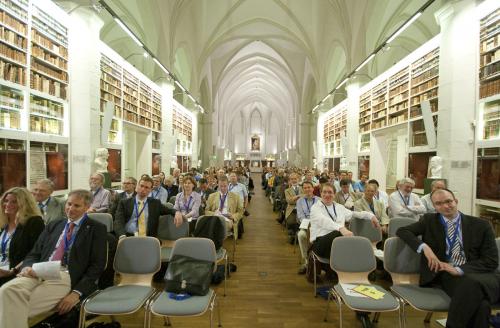'If You Build It, They Will Come'

Inauguration of Göttingen Centre for Digital Humanities
Dr. Haim Gertner (Director Archives Division at EHRI partner Yad Vashem) held a key note lecture at the Digital Humanities ceremony in Göttingen, Germany, featuring the inauguration of the Göttingen Centre for Digital Humanities and the release of TextGrid 1.0. The Georg-August-University Göttingen is a partner of EHRI.
More than 200 guests attended the Digital Humanities Ceremony on July 12, 2011 at the Göttingen Paulinerkirche, the historical building of the Göttingen State and University Library, to celebrate the release of TextGrid 1.0 and the formal inauguration of the Göttingen Centre for Digital Humanities (GCDH). Representatives from research, cultural, and political institutions emphasized in their speeches the significance of digital humanities, its prospects and potential.
TextGrid, a virtual research environment for philologists, linguists, musicologists, and art historians, aims to support access to and exchange of data by means of modern information technology (the Grid). Started in 2006, the web-based platform will provide services and tools for researchers for analysis of text data in various digital archives - independently of data format, location, and software.
The Göttingen Centre for Digital Humanities’ major tasks include the implementation, promotion, and maintenance of digital editions, research, and teaching in the field, and the development of virtual research environments. Its objective is the integration of computer-aided methods, tools, and infrastructure into the humanities.
In his key note lecture '"If You Build It They Will Come": Why Do We Need To Provide Access To Humanities Knowledge Bases', Dr. Gertner gave an impressive example of how digital technology has the potential to reach the general public.  This vast audience beyond strictly academic contexts is, as Dr. Gertner emphasized, by itself generated by the open-access-based availability of those materials and documents - biographies and personal data - held by the digital archive of Holocaust research. In short: access creates audience.
This vast audience beyond strictly academic contexts is, as Dr. Gertner emphasized, by itself generated by the open-access-based availability of those materials and documents - biographies and personal data - held by the digital archive of Holocaust research. In short: access creates audience.
The program included the presentation of various related research initiatives like DARIAH-DE (BMBF) and the Digital Humanities Verbundprojekt (Nds.-MWK). After the lectures, philologists, library and information scientists, philosophers, and computer scienctists discussed the challenges, potential, and prospects of the Digital Humanities on the Göttingen 'Red Sofa'. A prominent topic was the (growing) acceptance of DH by the research community.
The ceremony was closed by the official inauguration of the Göttingen Centre for Digital Humanities. The following day offered TextGrid training sessions as well as workshops on central issues in the Digital Humanities (text mining, sustainability).
Links:
TextGrid: www.textgrid.de/en.html
GCDH: www.gcdh.de
Presentation of Dr Haim Gertner at Digital Humanities ceremony: www.youtube.com/watch?v=ktx08lBPhA0 / http://bit.ly/ptHgxE
Yad Vashem World Center for Holocaust Research, Education, Documentation and Commemoration: www.yadvashem.org
DARIAH-DE: http://de.dariah.eu
Sybille Söring, Felix Lohmaier, Kepa J. Rodriguez (SUB - Göttingen University and State Library)
